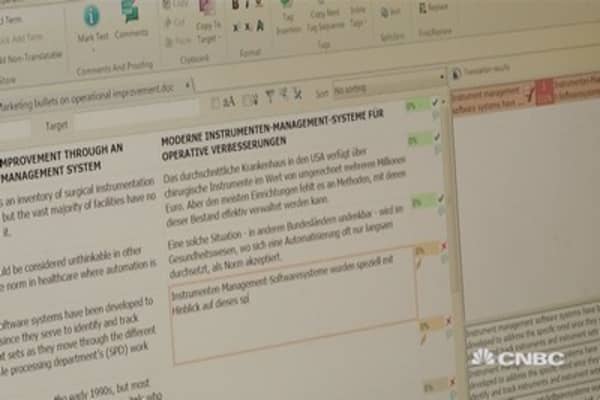As the Earth feels ever smaller, demand for translators and interpreters skyrockets
- The number of people employed in the translation and interpretation industry has doubled in the past seven years.
- Rather than replacing them, technology has helped translators and interpreters improve their performance.
- Working at the United Nations is one of the most coveted roles for a translator or interpreter.

The United States is becoming more globalized and interconnected each day. As a result, skilled translators and interpreters are finding their services in higher demand.
For Jutta Diel-Dominique, the boom in business is welcome. She decided in high school that she wanted to pursue a career in translation, developing a fascination with the English language in her home country of Germany.
“As the economy becomes more globalized and businesses realize the need for translation and interpreting to market their products and services, the opportunities for people with advanced language skills will continue to grow sharply,” said David Rumsey, president of the ATA, adding that the association predicts the largest growth is within contracted positions, giving workers and companies more flexibility.
While salaries within the industry vary, those who specialize in a difficult language can easily bring in six figures annually. The ATA helps connect freelance translators and interpreters with companies including Microsoft, Netflix and Honda, as well as government agencies such as the State Department and FBI, Rumsey said.
Philadelphia-based CETRA Language Solutions and companies like it work with about 1,000 independent contractors in translation services in any given year and recruit on a daily basis. And while there was once a fear that technology would replace humans in the process as demand for services increased, the opposite has happened — it’s enhanced their work.
“The overall industry is growing because of the amount of content out there — it’s increasing exponentially,” said Jiri Stejskal, president and CEO of CETRA. “Technology is helping to translate more content, but for highly specialized content, you need an actual human involved.”
But finding successful employment is about much more than just speaking multiple languages fluently. Translators who want to distinguish themselves as professionals have to continue to work and hone their skill sets, the ATA’s Rumsey said.
“It’s a lifelong practice, and it requires keeping up not only your language skills but your subject matter skills so that you really understand the industries and fields you are working in,” Rumsey said.
Translating at the United Nations
Industry growth also extends beyond just companies seeking services. Organizations such as the United Nations are also hiring skilled translators, looking to add some 50 employees to its ranks of 450 translators, editors and verbatim reporters in New York City as its workload increases. Positions at the U.N. are highly coveted, and translators work on tight deadlines.
“We cannot afford second quality,” said Zhongliang Chen, chief of the Chinese translation service documentation division at the United Nations department for general assembly and conference management. “The United Nations is a political organization, dealing with a lot of sensitive issues, and the member states demand the best from the translators.”
Each year, thousands of people apply to take the organization’s language competitive exam so they can work as translators with the organization, but only a few hundred, like Ghia El Bardan, are successful.
The 31-year-old previously worked as a translator in a peacekeeping mission in her home country of Lebanon. Now she’s putting her language skills to work at the U.N., translating documents from English and French into her native Arabic.
“Ever since I was in high school, I was fascinated with foreign languages and cultures,” El Bardan said.
Early stage translators at the U.N. can make around $60,000 a year to start but can move into the six-figure range depending on the role. Opportunities for advancement are far-reaching, and the payoff at the organization comes with the chance to be part of something greater than just a career.
“The best part of the job is the multicultural environment,” she said. “We come from different cultures, backgrounds, genders and age groups. I think this is enriching on the professional and interpersonal level.”









